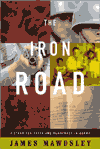| |
BOOK REVIEW
Reclaiming Burma
The Iron Road. A Stand for Truth and Democracy in Burma
by James Mawdsley
Reviewed by Sreeram Chaulia
"The only thing necessary for the triumph of evil is for good
men to do nothing." - Edmund Burke
 James
Mawdsley was introduced to me in a crowded London pub last year
as a "human rights activist" who shook the Burmese military
junta. I accepted that description, having only a sketchy
knowledge of details. However, after completing The Iron Road,
I am inclined to think that rights activist is too narrow a tag
for him. He is a seeker of truth, inner truth, in the Gandhi
mould. His duel for the past several years against the
totalitarian Burmese junta is not merely for physical and
political freedom, but "a still more vital one - inner freedom
... to do right, to obey God, to love". (p.380) James
Mawdsley was introduced to me in a crowded London pub last year
as a "human rights activist" who shook the Burmese military
junta. I accepted that description, having only a sketchy
knowledge of details. However, after completing The Iron Road,
I am inclined to think that rights activist is too narrow a tag
for him. He is a seeker of truth, inner truth, in the Gandhi
mould. His duel for the past several years against the
totalitarian Burmese junta is not merely for physical and
political freedom, but "a still more vital one - inner freedom
... to do right, to obey God, to love". (p.380)
Mawdsley's Herculean one-man defiance of a bloodthirsty
genocidal regime is made possible by a deeply spiritual mind
which has abjured violence and learnt to love the entire human
race as belonging to one family. Even in the darkest hours of
torment and torture, he is conscious of countering the evil in
the perpetrators and not the individuals per se. A strong sense
of duty and responsibility for maintaining good in the world,
coupled with genuine sensitivity for the sufferings of the
Burmese people, make Mawdsley a real hero who sacrifices to
attain personal happiness. His contribution towards reclaiming
Burma for humanity springs not from the altruism of a do-gooder
philanthropist or the cold calculation of a politician, but from
a pursuer of personal happiness and peace.
Mawdsley's epic tryst with Burma began in 1995, when he read
news reports of forced labor, conscription for fighting and
minesweeping, and scorched earth policies of the military junta.
Like all conscionable people, he felt the urge to "do
something", but what won the day was a thorough reading of Aung
San Suu Kyi's Freedom From Fear. Mawdsley sunk into the
book and imbibed the vital message: "To allow oneself to be
trapped by fear is a fatal mistake." (p.23) He went to Thailand
and contacted the All Burma Students Democratic Front (ABSDF)
and pleaded to be given a chance to stage a symbolic protest
inside Burma. He was smuggled to Minthamee camp in the bordering
Karen state and appointed "English teacher" for the
pro-democracy students who escaped from the military's massacres
in central Burma.
Mawdsley being Mawdsley, he learnt more from his pupils than
vice-versa. In a country where all forms of free literature and
university learning are banned, there was a "natural thirst for
education sharpened by years of deprivation". Bright young
students and deserters from the Tatmadaw (Burmese army) knew
what was needed when democracy came and saw Mawdsley as a window
to the wider world. "Having a big white clown blundering around
the camp is a sure sign to them that the outside world has not
forgotten them." (p.41)
This idyll came to a sudden end when the Tatmadaw launched a
fierce offensive on Minthamee. The generals spared not even
Mawdsley's primary school. He was whisked back across the Thai
border and left pining for another opportunity to enter Burma.
"What I really wanted was to take up the fight where extra
people were most needed - in Burma itself." (p. 51) He returned
to Thailand in no time and contacted Burmese refugees at
Maneeloi camp and leaders of the Karen National Union who were
waging an armed insurgency against the State Law and Order
Restoration Council, as the State Peace and Development Council
(SPDC) was then known. He begged to be allowed to go to Rangoon
to make a "simple demonstration in support of democracy",
pacifying doubting Thomases by suggesting "as soon as I am
arrested, the world press will know all about it and the junta
will not be able to make me disappear". (p.64) Once they
realized that the world was watching an Englishman's detention,
the generals would not resort to the casual brutality which
Burmese people were subjected to, he reasoned.
In Rangoon, Mawdsley dramatically chained and padlocked himself
to the gates of a school opposite the government building where
Aung San was assassinated in 1947. He drew curious onlookers'
attention by shouting democracy slogans, distributing fliers and
demanding the release of all political prisoners and the opening
of universities. Arrested immediately, he was put on a plane and
deported after the intervention of British and Australian
consular officials. One of the guards at the airport
surreptitiously stole up to him when his superiors were not
watching and said, "Thank you for what you have done. I really
never forget you [sic]." (p.86) This was a manifestation of the
extreme cruelty and coercion culture in the Burmese army which
had driven subalterns and lower-ranked men into a state of
vegetation, suicide or silent acceptance of fate. Mawdsley would
come back for them and millions of others.
Inspired further by reading Vaclav Havel's writings, the author
reasoned that "by asserting the values of truth, by defying the
regime's wicked manipulations and continuing to defy them, you
call into question their power". (p.93) He returned to Thailand
and requested the Kayin National Union, Burma's largest
anti-government ethnic armed group, to arrange for his escort
deep into Burmese territory. In a magical trek through the
jungles of Karen state, he encountered burnt villages and
terrified civilians everywhere. "The deal for the locals is that
they either inform the Tatmadaw of everything or be executed for
withholding information." (p.118) On reaching Moulmein, Mawdsley
walked to the town center and nonchalantly distributed
pro-democracy tapes, stickers and leaflets, shouting at the top
of his lungs before audiences for the release of Min Ko Naing
and other student leaders.
Taken into custody, Mawdsley refused to divulge any details. His
face was blindfolded with a cloth dipped in petrol. "Could I
hold out under torture? Shall I tell them my name or risk having
my face burnt off?" (p.134) Illegal detention and harassment
continued for days at Insein, with exasperated and bewildered
policemen applying the favorite tactic of Burma's military
intelligence (MI), the "Iron Road", a painful rolling of iron
rods up and down the shins of the victim until they strip one to
the bone. What kept Mawdsley going were prison trusties and
guards tiptoeing up to him late at night and sympathetically
whispering, "I am sorry", ashamed of what their regime was
doing.
Forty handpicked uniformed goons watched Mawdsley's mock trial
where he was arbitrarily sentenced to five years imprisonment on
charges of being a "mercenary" and an "insurgent terrorist".
Jail life was predictably horrific. Mawdsley called for a doctor
when he collapsed from malnutrition or got infected by scabies,
shocking the authorities. "The notion that a prisoner has rights
made no sense to them. If I was starving to death, that was my
business." (p.159) The MI were used to doing anything they liked
with Burmese citizens, but were perplexed how to deal with an
assertive foreigner. Within months, it was decided to release
him and send him back to Britain. Mawdsley's best was yet to
come.
"As I thought about Burma by day I also dreamt about her at
night." (p.184) His restless soul wanted more battle with deceit
and untruth. Campaigning and lobbying against the junta in the
West did not satisfy him. The prodigal son returned to Thailand
and hooked up this time with the Karenni National Progressive
Party and extracted a promise to be taken across the Salween
river and the legendary impassability of northern Burma's
landscape. Convinced that "fearlessness, and public displays of
fearlessness, are the greatest threat to a regime that rules by
fear" (p.12), Mawdsley got to Tachilek in eastern Shan state by
August 1999 and redid the symbolic protest. A kangaroo court
sentenced him to 17 years in solitary confinement on a series of
trumped up charges. "The court is not a court, the judge is not
a judge, yet they are dressed up as such. Merciless men sit
behind it all saying they have a judicial system." (p. 218)
Incarcerated in Kengtung, Mawdsley did not despair at the length
of the sentence and went about practicing his trade of
non-violent disobedience. Prison officials could not overtly
show their approbation, but they found other ways to repay him
for his extraordinary stoicism. These small gestures in a
Gulag-like ambience sustained him. "You do not need praise or
back-patting; you need to be reminded that there is a truth and
a truth worth suffering for." (p. 232) Since Burma itself was a
macrocosmic prison, Mawdsley was happy to be in a real prison.
When the MI sleuths were distracted, some jailors came to him to
shake hands and confess, "we are on the same side". He observed
how rational and reasonable individuals had been subdued by
incessant propaganda and bootstrapped to servitude by Than Shwe
and his entourage in power. Burmese police, soldiers and
bureaucrats had not lost their conscience, but they were not
willing to openly declare that either, for fear or reprisal.
Mawdsley drew on his spiritual strength to tide over crisis
after crisis, shedding any remnants of fear inside him inch by
inch. "Ninety percent of my struggle was against myself." (p.
284)
Determined to expose the deceit and fraud of his sentence,
Mawdsley went on hunger strike for 20 days, one day each for the
20-year sentence passed on Min Ko Naing. "If he must do another
year in a solitary cell, can I not do another day without food?"
(p. 307) Hundreds of letters of support poured in as news of his
strike was communicated to the media by British consular
officials. Mawdsley rejoiced at the outpouring of concern by his
fellow prisoners too and at the wider publicity his actions were
generating. As more and more spoke up around the world, he noted
with satisfaction, "We gain nothing at all by buttoning our lips
in the face of injustice. We put the brakes on progress every
time we fall for self-censorship." (p. 338)
Enterprising lawyers took Mawdsley's case to the US Senate, the
British parliament, the European parliament and the United
Nations. News of more savage beatings meted out to him outraged
thousands. The UN working group on arbitrary detention found the
Burmese junta in violation of 10 points of international law and
declared that Mawdsley's detention was from the beginning
arbitrary and illegal. Under intense diplomatic pressure, the
SPDC released him in October 2000, after undergoing 411 days of
prison.
Mawdsley believes that what brought about his unshackling is the
same medicine needed for democracy and truth to prevail in
Burma: "A resonance between the forces within the borders and
the forces without." (p. 350) Forty-five million Burmese people
are resisting the onslaught that has never ended since the coup
de tat of 1962, but the skill with which the junta has rewritten
history, brainwashed young people and policed the entire country
will make it a long walk to freedom. Aung San Suu Kyi may be out
of jail through UN mediation, but she is virtually in house
arrest again. Neighboring big powers have turned "realist" and
are cooperating with the junta in spite of its horrendous
domestic and foreign policy record. The superpower is chasing
oil in Iraq and has no interest in a forbidden land called Burma
that no longer figures in balance of power games of the mighty.
But Burma will not give up. Nor will James Mawdsley. When "demokrasi"
comes, he will be one of the first to break into a dance on the
streets of Rangoon.
The Iron Road. A Stand for Truth and Democracy in Burma
by James Mawdsley. North Point Press, New York, 2002. ISBN:
0-86547-637-3. Price: US$16.00, 397 pages.
(©2002 Asia Times Online Co, Ltd. All rights reserved. Please
contact [email protected]
for information on our sales and syndication policies.) |
| |
|
|
 |
|




 James
Mawdsley was introduced to me in a crowded London pub last year
as a "human rights activist" who shook the Burmese military
junta. I accepted that description, having only a sketchy
knowledge of details. However, after completing The Iron Road,
I am inclined to think that rights activist is too narrow a tag
for him. He is a seeker of truth, inner truth, in the Gandhi
mould. His duel for the past several years against the
totalitarian Burmese junta is not merely for physical and
political freedom, but "a still more vital one - inner freedom
... to do right, to obey God, to love". (p.380)
James
Mawdsley was introduced to me in a crowded London pub last year
as a "human rights activist" who shook the Burmese military
junta. I accepted that description, having only a sketchy
knowledge of details. However, after completing The Iron Road,
I am inclined to think that rights activist is too narrow a tag
for him. He is a seeker of truth, inner truth, in the Gandhi
mould. His duel for the past several years against the
totalitarian Burmese junta is not merely for physical and
political freedom, but "a still more vital one - inner freedom
... to do right, to obey God, to love". (p.380) 





